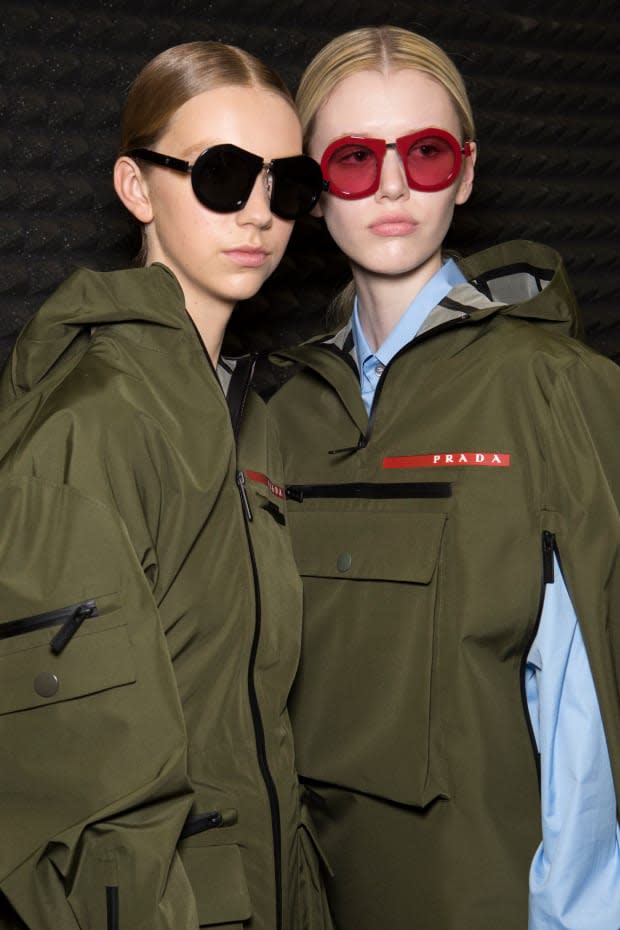Must Read: The Rise and Fall of Prada, Risks and Rewards of a Private Client Business
Plus, how Instagram killed the It bag.

These are the stories making headlines in fashion on Wednesday.
The rise and fall of Prada
Prada is one of the most influential luxury brands of our time, yet in recent years the company has seen a major decline in sales due to a slowdown in China and brand investment. What was once one of the most anticipated shows of the season quickly fell into the realms of financial instability with the brand's annual profit falling nearly 28% in 2014. Though Prada has faced financial hardship in recent years, it still is coveted by new and old fans, which hints at a potential comeback. {The New York Times}
The risks and rewards of a private client business
There are a few designers showing at London Fashion Week who operate small yet prosperous private client businesses, alongside their retail and wholesale business. For designer Emilia Wickstead, private client business is necessary, as it accounts for 40% of her brand's revenue. According to Wickstead, her private client business is the fastest growing direct retail category, and it's forecasted to increase 30% in 2019. Though time consuming and a lot of work, many brands are offering bespoke designs and "made to order" services, which facilitate the fostering of private relationships with their customers. {Business of Fashion}
How Instagram killed the It bag
The luxury goods market has seen a major transformation due to the growth of athleisure and social media. In the U.S., the number of handbags introduced by a luxury brand has declined by 33%. Many believe this decline in interest is due to Instagram and social media's quick exposure to trends before they're able to gain any momentum. Mini bags —which reached peak popularity after the introduction of Jacquemus' "Le Chiquito" bag —took off because of their affordability compared to traditional It bags. Though mini bags have gained traction, many customers are moving toward purchasing bags that offer functionality (like backpacks and duffles), ditching the traditional handbag. {Vogue Business}
Inside the remaking of Jil Sander
This isn't the first time German luxury brand Jil Sander has reinvented itself. Now spearheaded by married co-creative directors Lucie and Luke Meier, it recently won praise from fashion press for the pair's ambitious plans to revamp the brand. The pair intends on redesigning the label's flagship stores, recently opened a new gallery-retail concept near its headquarters in Milan and plans on launching a directly operated e-commerce site in December. "It feels like a lot, but it also feels quite fresh to us," says designer Luke Meier. The Meiers aim to leave their mark on the Jil Sander label in hopes that their time at the brand isn't short lived. {Business of Fashion}
Dressing for the British identity crisis
The United Kingdom is facing a major identity crisis as it prepares for the imminent Brexit deadline on Oct. 31, and the identity crisis has started to develop its own look. At London Fashion Week, many British designers sent looks down the runway that seemingly nodded in the direction of dressing for survival and shelter. At JW Anderson, the main accessory was a detachable bikini top that could be tied on and off. At some shows, the silhouette's resembled a tent, in case one needed to take refuge. And at Christopher Kane, the collection directly referenced the environmental crisis. These days, it's quite obvious that what it means to be British is deeply emotional and complicated. {The New York Times}
Instagram to restrict certain content from users under 18
In an effort to deal with the growing industry of influencer marketing on its platform, Instagram has decided to restrict content that promotes weight loss products and cosmetic procedures for users under 18. In the coming weeks, Instagram also plans to introduce new tools that will allow users to report posts they believe violates the new policy.
"We want Instagram to be a positive place for everyone that uses it and this policy is part of our ongoing work to reduce the pressure that people can sometimes feel as a result of social media," says Emma Collins, Instagram's public policy manager. {Buzzfeed News}
Never miss the latest fashion industry news. Sign up for the Fashionista daily newsletter.
